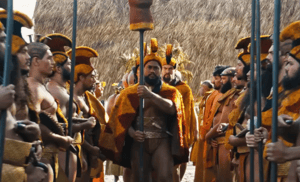Public Interest Journalism funded through NZ On Air
New Zealand-based fashion designer Dru Douglas has always gravitated towards the women of his family growing up in Papua New Guinea. His fashion label Lumai, named after his mother’s indigenous Kuanua name, was inspired by the beautiful women of Melanesia and as a way for Douglas to embrace his heritage and in turn, himself.
Growing up in Rabaul, Douglas experienced a childhood unique to his island home. At the age of 11 years, his life was uprooted by the 1994 twin volcanic eruptions that buried his ancestral home of Rabaul, displacing him, his family and the entire town.
“School was cancelled for like three or four months after that… Looking back, it was a very traumatic experience for my family and for the elders because we lost everything. We lost our home, we lost our- I have no idea what I looked like as a baby, we lost all our photos,” Douglas said.
“I went to my mum’s family who was living in these care centres after being displaced. It was just a beautiful experience for me like I got to play with my cousins and we were living in these tarpaulin cities, these camps and all the kids played around together, we played on the field. The fact that I went through this, maybe that helped me process things.”
Looking back on his Papua New Guinea childhood through an idyllic lens, his love for the village that cared for him created the foundation for his fashion label, Lumai, which didn’t come until many years later.
At 18 years old, Douglas moved to New Zealand on a government scholarship for IT. This shift was a huge culture shock that forced him out of his shell in an overwhelming new place.
“I think I was so unsure of myself. Living back home, you sort of get told how to behave, how to talk, how to do all sorts of things. So when I came here, I was independent so it was a massive learning experience… Lumai is just a progression of me sort of embracing myself and trying to fulfil something that I’ve always wanted to do since I was a child but I just wasn’t able to until that point in the last few years.”
Douglas then studied design at AUT, tapping into the feelings of love he felt from the women in his family when creating beautiful garments.
“Being a queer Pacific Islander, I guess I’m quite effeminate and that was something that I’ve struggled with especially growing up, it was very difficult. But what was so evident about my
experiences growing up was that the women were always the ones that would embrace me, who wouldn’t push me away or try to change me in any way.”
“[Being] constantly surrounded by my aunties and cousins, they were such beautiful women. The way they carried themselves, in the way they styled themselves. They styled themselves with just whatever they had, whatever they found in a second-hand shop or just oversized t-shirts and cutting things up and I always just loved that, I loved the confidence.”
Douglas looked back at old historic photos of Papua New Guinea women as a starting point, he says they always dressed with a sense of comfort and ease because the weather was so
hot.
He also pulls from his dual heritage and upbringing when it comes to his designs, with his dad’s side being Anglo-Indian, Douglas’ diverse background serves as a base for Lumai’s
cross-cultural aesthetic.
Douglas created Lumai as a way to showcase Melanesian representation, saying he’s always felt the erasure of Melanesia and Micronesia living in such a Polynesian-centric city like Auckland.
However, seeing things like the Melanesian Festival, the first of its kind here in Aotearoa, Douglas says it’s a “beautiful beginning to what is possible for us here.”












